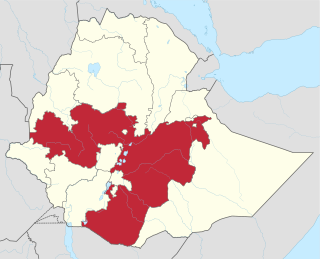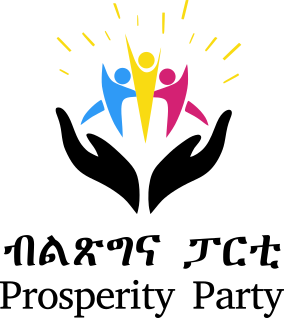
The politics of Ethiopia are the activities associated with the governance of Ethiopia. The government is structured as a federal parliamentary republic with both a President and Prime Minister.

The Ethiopian People's Revolutionary Democratic Front was an ethnic federalist political coalition in Ethiopia. The EPRDF consisted of four political parties, namely Tigray People's Liberation Front (TPLF), Amhara Democratic Party (ADP), Oromo Democratic Party (ODP) and Southern Ethiopian People's Democratic Movement (SEPDM). After leading the overthrow of the Communist People's Democratic Republic of Ethiopia, it dominated Ethiopian politics from 1991 to 2019.

The Tigray People's Liberation Front (TPLF) is a political party in Ethiopia, established on 18 February 1975 in Dedebit, northwestern Tigray, according to official records. Within 16 years, it had grown from a few dozen men into the most powerful armed liberation movement in Ethiopia. It has led a coalition of movements named the Ethiopian People's Revolutionary Democratic Front (EPRDF) since 1989. With the help of its ally, the Eritrean People's Liberation Front (EPLF), EPRDF overthrew the dictatorial PDRE regime and established on 28 May 1991 a new government that has ruled Ethiopia ever since. The TPLF and the EPLF are the only African liberation fronts which defeated an enemy whose military power is vastly superior: conducted as a "protracted peoples' war", the armed struggle against PDRE ended with a total military victory. They are also the only fronts that skilfully combined the struggle for national self-determination with radical socio-economic changes.

At the federal level, Ethiopia elects a legislature. The Federal Parliamentary Assembly has two chambers: the Council of People's Representatives with not more than 550 members as per the constitution but actually nearly 547 members, elected for five-year terms in single-seat constituencies; and the Council of the Federation with 117 members, one each from the 22 minority nationalities, and one from each professional sector of its remaining nationalities, designated by the regional councils, which may elect them themselves or through popular elections.

The Oromo Democratic Party (ODP) was a political party in Ethiopia, and part of the alliance with the Amhara National Democratic Movement, the South Ethiopian Peoples' Democratic Front and the Tigrayan Peoples' Liberation Front that forms the Ethiopian People's Revolutionary Democratic Front (EPRDF). At the last legislative elections, 15 May 2005, the party was part of the Ethiopian People's Revolutionary Democratic Front, that won 327 out of 527 seats.

The Southern Ethiopian People's Democratic Movement (SEPDM) was a political party in Ethiopia. At the last legislative elections, 15 May 2005, the party was part of the Ethiopian People's Revolutionary Democratic Front, that won 327 out of 527 seats in the Council of People's Representatives.

The Benishangul Gumuz People’s Democratic Unity Front was a political party in Ethiopia. In the most recent elections held 23 May 2010, the BGPDUF won 9 seats. In local elections held the same day, the BGPDUF won 98 of the 99 seats in the Benishangul-Gumuz parliament.

The Gambela Peoples’ Democratic Movement was a political party in the Gambela Region of Ethiopia. It is the regional ally of the ruling EPRDF coalition.

Hailemariam Desalegn Boshe is an Ethiopian politician who served as 9th Prime Minister of Ethiopia from 2012 to 2018. He also previously served as Deputy Prime Minister and Minister of Foreign Affairs under Prime Minister Meles Zenawi from 2010 to 2012. After Meles' death in August 2012, Hailemariam succeeded him as Prime Minister, initially in an acting capacity. He was then elected as the Chair of the Ethiopian People's Revolutionary Democratic Front (EPRDF), the ruling party, on 15 September 2012. Hailemariam also served as the Chairperson of the African Union from 2013 to 2014.

The Afar Liberation Front is an Afar political party and former militant group in Ethiopia. It fought the communist Derg government and the People's Democratic Republic of Ethiopia from 1975 to 1991. After the Ethiopian Civil War ended in 1991, the ALF continued to promote Afar interests in the country peacefully.

General elections were held in Ethiopia on 7 and 18 May 1995 for seats in its Council of People's Representatives; elections in the Afar, Somali, and Harari Regions were delayed until 28 June to assign experienced personnel who could solve possible conflicts and irregularities. This was the first regular multi-party election in Ethiopia's history, and the first election since the adoption of a permanent constitution the previous December. Several opposition parties boycotted the election, including the All-Amhara People's Organization, Council of Alternative Forces for Peace and Democracy in Ethiopia, and Ethiopian Democratic Unity Party.

Ethiopia held general elections on 14 May and 31 August 2000 for seats in both its national House of Peoples' Representatives and several regional government councils. Although several opposition parties boycotted the election, 17 parties including the All-Amhara People's Organization, the Southern Ethiopia Peoples' Democratic Coalition (SEPDC), and the Oromo National Congress did participate.

The Ethiopian Democratic Party is a political party in Ethiopia. The result of no less than five mergers of liberal and conservative liberal opposition parties, it could trace its roots to the Ethiopian Democratic Union, which mounted armed monarchist resistance to the Derg in the immediate aftermath of the overthrow of Haile Selassie I. In the legislative elections held on 15 May 2005, the United Ethiopian Democratic Party - Medhin, as it was then known, was part of the United Ethiopian Democratic Forces, that won 52 out of 527 seats in the Council of People's Representatives. It won no seats in the 2010 elections.

A parliamentary election was held in Ethiopia on May 23, 2010.

Elections for a Constituent Assembly were held in Ethiopia on 5 June 1994 in order to form a body to draw up a new constitution. They were the first elections after the overthrow of the Mengistu regime at the end of the Ethiopian Civil War in 1991, and the first ever multi-party elections in the country; previous elections had either been non-partisan or one-party. The results saw the Ethiopian People's Revolutionary Democratic Front and its allies win 463 of the 544 seats. Voter turnout was 87.5%.

The Transitional Government of Ethiopia (TGE) was established immediately after the Ethiopian People's Revolutionary Democratic Front (EPRDF) and the Tigray People's Liberation Front (TPLF) seized power from the Marxist-Leninist People's Democratic Republic of Ethiopia (PDRE) in 1991. During the transitional period, Meles Zenawi served as the president of the TGE while Tamrat Layne was prime minister. Among other major shifts in the country's political institutions, it was under the authority of the TGE that the realignment of provincial boundaries on the basis of ethnolinguistic identity occurred. The TGE was in power until 1995, when it transitioned into the reconstituted Federal Democratic Republic of Ethiopia that remains today.
Parliamentary elections were held in Ethiopia on 24 May 2015 to elect officials to the House of Peoples' Representatives. Regional Assembly elections were also held on this date.

The Oromo conflict was an armed conflict between the Oromo Liberation Front (OLF) and the Government of Ethiopia. The conflict began in 1973, when Oromo nationalists established the OLF and its armed wing, the Oromo Liberation Army (OLA).

Abiy Ahmed Ali is an Ethiopian politician serving as 10th Prime Minister of Ethiopia and the 4th of the Federal Democratic Republic of Ethiopia since 2 April 2018. He is the first Oromo chairman of the ruling Ethiopian People's Revolutionary Democratic Front (EPRDF) from the Oromo Democratic Party (ODP), which is one of the four coalition parties of the EPRDF. Abiy is also an elected member of the Ethiopian parliament, and a member of the ODP and EPRDF executive committees.

The Prosperity Party is a political party in Ethiopia established on December 1, 2019 as a successor to the Ethiopian People's Revolutionary Democratic Front (EPRDF) by incumbent Prime Minister Abiy Ahmed. The merger into a countrywide party is part of Ahmed's general policy of distancing the country's politics from ethnic federalism, and it will thus run for the first time in the 2020 general election.













